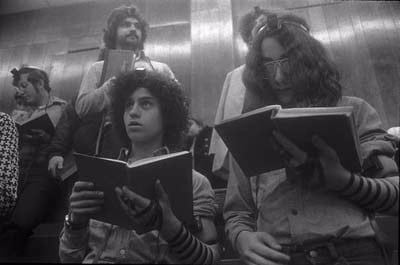The early Sixties saw the emergence of what was subsequently termed the “youth culture.”
In increasing numbers, the younger generation were growing distrustful of their elders and rejecting the values and way of life into which they had been raised.
Parents, educators and religious leaders were horrified. But the Rebbe saw the spiritual yearnings underneath the tumult. These young men and women, he said to his Chassidim, are searching for G‑d, without being fully aware of what they are looking for and where they can find it. They have taken a first important step in rejecting the false, humanly-contrived ideologies embraced by their parents forty and fifty years ago. Now they must be helped with the second step—the study of Torah and the observance of mitzvot, which is the key to uncovering the divine essence that resides in their souls.
Lubavitcher Chassidim began showing up in college campuses around the country. Drop-in centers were opened for students and “Encounter with Chabad” weekends were held, introducing young men and woman to the rich spiritual world of Torah and Chassidism. After decades, and even generations, of assimilation, young Jews were doing teshuvah--returning to their source and reclaiming their heritage.
The Rebbe on Using Rebellion for Good
"Our generation has been granted opportunities that have never been granted before. There has come about a tremendous awakening for what is being called “a return to the source.” That name, however, implies that one must journey a great and long distance to reach this source, when in truth every individual, whether righteous or iniquitous, possesses a soul that is a “part of G‑d above.” So he need not journey anywhere to reach the source, which resides in his own mind and heart; he need only remove the covering that conceals it. But since he does not know the means by which to remove the covering, he goes around declaiming his hunger and thirst."
"We must therefore fulfill the mitzvah to “Love your fellow as yourself.” We must go to this hungering and thirsting person and explain to him what it is that he hungers for, and what it is that he thirsts for: for the word of G‑d."
From an address by the Rebbe, Purim of 1963 (free translation)





Start a Discussion